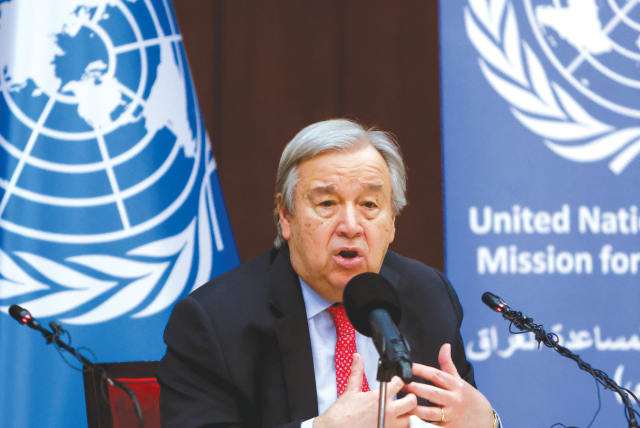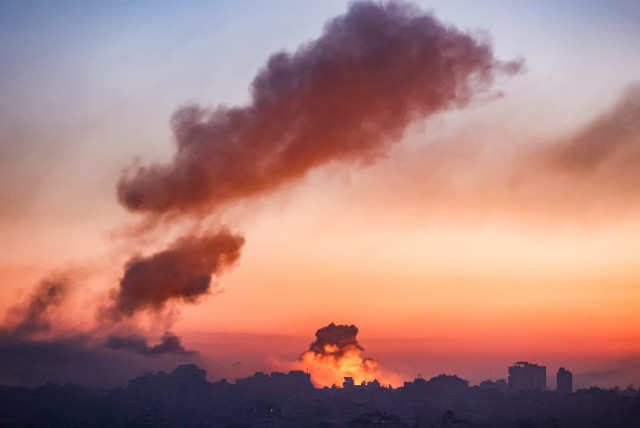UNSC may call for Gaza war cease-fire, release of hostages

The two proposals were put forward after the UNSC on Friday held its second closed-door consultation this week on the Gaza violence.
The United Nations Security Council could debate two separate resolutions put forward on Monday by Russia and Brazil, calling for a Gaza cease-fire and the release of the over 150 hostages seized by Hamas during its October 7th assault on Israel.
“We are convinced that the Security Council must act to put an end to the bloodshed and restart peace negotiations, with the view to establishing a Palestinian state as it was supposed to do so long ago,” Russian Ambassador to the UN Vassily Nebenzia told reporters in New York.
Israel’s aerial attacks on the Gaza Strip are reminiscent to Russians of the siege of Leningrad during the World War II, he said.
Israel’s demand for one million Gazan civilians to evacuate from the north in 24 hours and to “concentrate them in a de-facto ghetto in the south” of the Strip, “are unacceptable and can lead to irreversible catastrophic consequences,” Nebenzia said.
He spoke one week after Hamas launched a war against Israel with an assault against southern border communities in which over 1,300 civilians and soldiers were killed.
Israel has since bombarded Gaza from the air and is preparing for a ground campaign to destroy Hamas’s military and governmental powers in the Strip that is home to 2.2 million people.
He took issue, in particular, with Israel’s decision to cut electricity, water, fuel, and food to Gaza, calling such a step a “war crime.”
Nebenzia blamed Washington for the violence, explaining that it had been a mistake to advance regional peace with Israel while ignoring the Palestinians.
Russia demands action
“Russia cannot accept the complete inaction and lack of any reaction on the part of the UNSC,” he said. Russia is one of five permanent members of the 15-member security, which along with the US, has veto power at the council.
It’s expected that the US would veto both the Russian text and the Brazilian text. Israel’s mission to the UN in New York is working alongside the American mission to ensure that the resolutions are not adopted. The resolutions need the approval of nine UNSC members to pass. Israel is hoping that the resolutions – if they come to a vote – would fail to receive the necessary votes.
The Russian text does not condemn Hamas for the killing of 1,300 civilians and soldiers during its surprise assault and taking some 150 people hostage.
Nor does it call out Israel for the deaths of over 2,200 Palestinians during aerial strikes in the Gaza Strip. “This is a humanitarian resolution and is not political,” Nebenzia told reporters.
The Russia draft text suffices with strongly condemning “all violence and hostilities directed against civilians and acts of terrorism.”
The resolution also calls for “the unimpeded provision and distribution of humanitarian assistance” in Gaza “including of food, fuel, and medical treatment, as well as creating conditions for the safe evacuation of civilians in need.”
In addition, the resolution “calls for an immediate, durable and fully respected humanitarian ceasefire and “calls for the secure release of all hostages.”
A separate resolution authored by Brazil, which holds the rotating UNSC presidency this month, specifically names both Hamas and Israel.
That text “strongly condemns the terrorist attacks by Hamas: on October 7 “and the taking of civilian hostages.” It calls for their “unconditional release” and demands “all parties involved… ensure their safety, well-being, and dignified treatment in compliance with international law.”
The Brazilian resolution also calls for an immediate cease-fire and “firmly condemns all violence and hostilities directed against civilians and all acts of terrorism.”
The resolution urged Israel to rescind its call for civilians and UN staff to evacuate all areas north of Wadi Gaza and demanded a humanitarian pause and the creation of a humanitarian corridor. It also demanded an “end to all measures that result in the deprivation of civilians of objects indispensable to their survival, including electricity, water, fuel, food and medical supplies.”
The two proposals were put forward after the UNSC on Friday held its second closed-door consultation this week on the Gaza war.
Brazilian Foreign Ministry Mauro Luis Lecker Vieira said the immediate objection is clear and immediate, “to prevent further bloodshed and loss of life.”
Jerusalem Post Store
`; document.getElementById("linkPremium").innerHTML = cont; var divWithLink = document.getElementById("premium-link"); if (divWithLink !== null && divWithLink !== 'undefined') { divWithLink.style.border = "solid 1px #cb0f3e"; divWithLink.style.textAlign = "center"; divWithLink.style.marginBottom = "15px"; divWithLink.style.marginTop = "15px"; divWithLink.style.width = "100%"; divWithLink.style.backgroundColor = "#122952"; divWithLink.style.color = "#ffffff"; divWithLink.style.lineHeight = "1.5"; } } (function (v, i) { });

